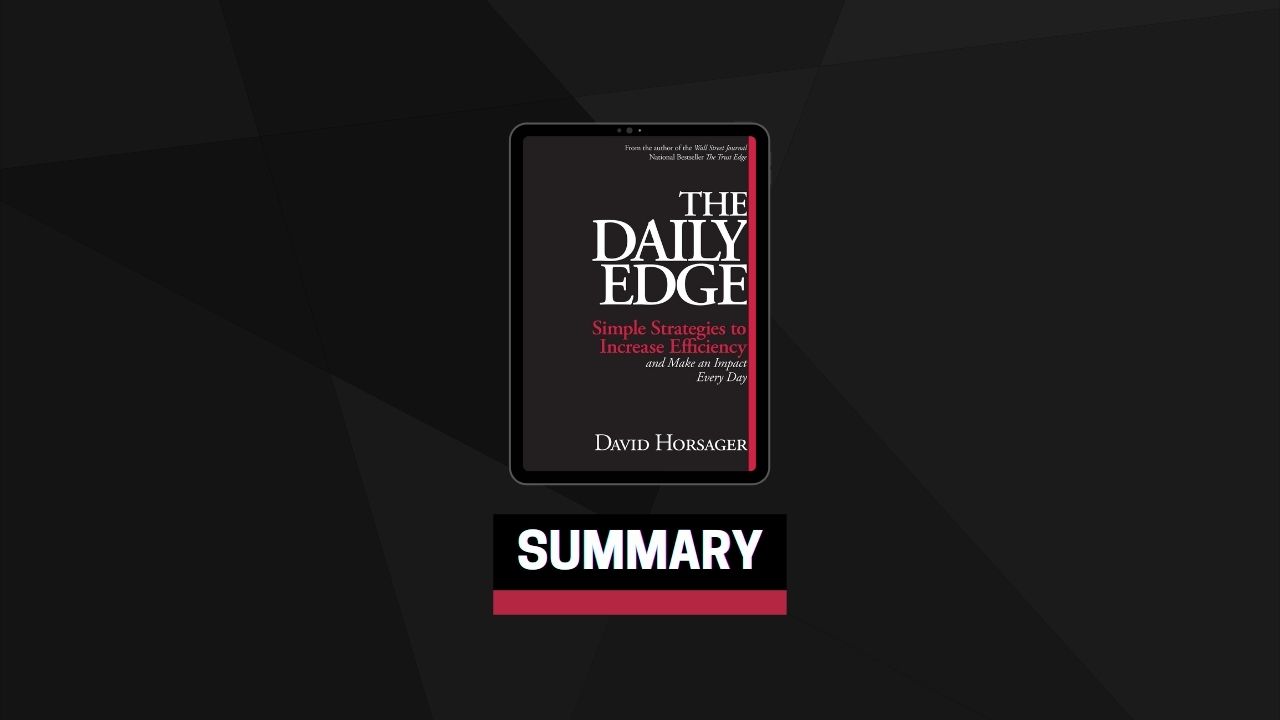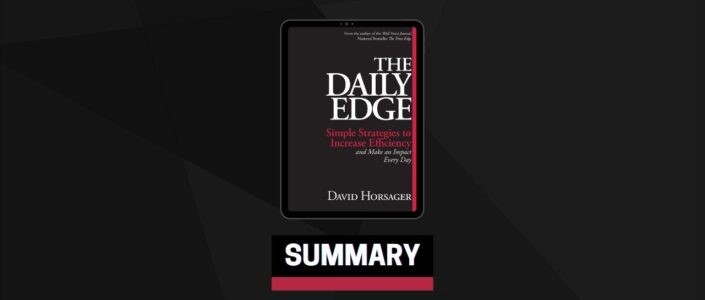Tip 1. 90-Day Quick Plan
People often think, “I have all year to get going on that.” 90 days is a sweet spot. It is a short enough time frame to stay absolutely focused, and yet it is long enough to get more done than most people get done in a whole year.
Here’s how to make it work. Pick an area of your business or life that you’d like to address, and then ask six questions. The plan should take less than 30 minutes to create.
Question 1: Where am I?
Question 2: Where am I going in 90 days?
Question 3: Why am I going?
Question 4: How are we going to get there?
Question 5: How are we going to get there? I
Question 6: How are we going to get there?
With greater clarity around your 90-day plan, you will gain the trust of your team and bottom-line results will follow.
Tip 2. DMA’s: Difference-Making Actions
DMA stands for Difference-Making Actions. DMA’s simply give focus and intentionality to do the most important things every day. This simple strategy will increase results like nothing else. Make a habit of doing DMA’s on a daily basis and your impact will multiply.
Here’s how it works:
The DMA Strategy:
- First thing every morning, take a sticky note.
- At the top, write your most important current goal.
- Then write the numbers 1-5 down the page.
- Next to the 1, write the most important thing you could do today to accomplish that goal. Then write the next most important thing under 2, and so on.
- You now have a list of the 5 most important things you could to today that would make the biggest difference in accomplishing your goal and ultimately fulfilling your organization’s mission.
Tip 3. Power Hour
writing down your DMA’s is one thing, but getting them done is another. Despite our best intentions, we all know how quickly those priorities can be set aside in order to deal with the most urgent tasks
For 60 minutes each morning, we don’t do meetings, phone calls, or e-mails. We don’t take any interruptions. Messages go to voice mail and the inbox fills. Some would say, “You mean you won’t take a call from a client to serve them?” No, we won’t take a call during that hour so we can serve them even better. Unlike many offices, we can really focus, concentrate, and serve others best by actually getting something done for them. We focus on the activities we identified as most important to our long-term success.
Tip 4. Focus
Learning to concentrate isn’t complicated, but that doesn’t mean it is easy. Most of us have years, and possibly decades, of bad habits to break.
Eliminate distractions. Cell phones, e-mail, and even open office doors can invite unwanted interruptions. It’s not just the time that the interruption takes, but more significant than that is the time it takes to get your mind back to a focused productive state. There is an incredible amount of time and productivity lost in the, “Now, where was I?” state. Follow the guides in this book and eliminate anything that is likely to pull your attention away from the task at hand.
Keep sticky notes handy. By placing a pad nearby, but out of your field of vision, you give yourself an outlet for any thoughts or ideas that might come to you. For instance, if you’re working on a quarterly report, and you remember that you need to make an important call later, simply jot it down. You can review the note later, and the act of writing it should clear it from your mind.
Tip 5. Decide Now
The biggest reason we have counters and desks that are piled high is because we wait to make decisions. We fill our counter with mail we think we might get back to. We put stuff on the table that we plan on getting back to.
Simply put, you can “decide now” in order to enjoy less stress and greater clarity and productivity.
Here’s how to start:
Think. When you are about to put something down, really think: Is this where it goes? Am I really going to get back to this? Will I just need to throw this out later? Will I deal with this in less than a week?
Take time now. Write the thank-you note now rather than putting down on a sticky note to write one later. Read the article now rather than waiting for the perfect 15 minute break that you never get. If at all possible do it, use it, throw it, or complete it now. You are likely not coming back to it.
Tip 6. SEEDS First
Seeds grow best when the soil is cultivated, watered, and fertilized. People grow the most when they are ready physically, mentally, and spiritually. It is hard to accomplish a big goal if you are sick and tired. In order to be most effective as a person you need to make sure you plant your SEEDS first.
S = Sleep
E = Exercise
E = Eat right
D = Drink Water
S = Source of strength
Tip 7. Manage Your Energy
Understanding yourself can boost your productivity significantly. The key is completing the right tasks at the right time. When do you feel at your best? We all have a time of day when we feel most creative and productive. While a few people are more alert and energized in the afternoon or evening, most of us are charged up in the morning.
With that in mind, how do we spend these hours? Is it working on the projects and activities that require the most effort? Sadly, the answer is usually “no.” We stumble into work and burn the best part of our day checking e-mail, reading the newspaper, and catching up with coworkers. We throw away the chance to do our best work for an extra cup of coffee, and then we wonder where the day went.
Tip 8. Log It
Go to see any financial advisor in the country, and they’ll likely advise you to keep track of everything you spend for a week or two. The reason for this is that most of us don’t clearly know where our money is going. That is, beyond the mortgage and car payments, we usually stay blissfully unconscious of our more minor spending habits.
That would be fine, except that those minor habits add up. The four-dollar latte, purchased each morning, ends up costing nearly fifteen hundred dollars a year. Add in other impulsive buys, and it’s easy to understand how little purchases can build into huge sums.
Tip 9. Excellence, Not Perfection
Excellence is efficient; perfectionism is not. At some point, you have to stop.
These are a few techniques for delivering excellent work without giving in to perfectionism:
Do it right the first time. When you are working on something, give it your full concentration. Put your all into the task at hand. Chances are, you will do a great job and won’t need to come back to it later.
Give yourself a time limit. Estimate how long it should take you to do something well, and then stick to it. Once you have made the decision to move on to the next step at a certain time, you may find that you were more efficient in completing the task.
Know when to stop. You have to know when a project is finished. At a certain point, more changes are not making things better; they are just making them different. Learn to finish your work, check it over, and then move on to the next thing.
Get feedback. If you aren’t sure whether you are bettering your work or not, get feedback from a colleague or supervisor. An outside perspective can help you overcome perfectionist tendencies.
Tip 10. Plan Tomorrow Today
Though an old idea, this is one of the most valuable. It’s hard to get a running start on the day without a plan. An old aphorism says, “He who fails to plan, plans to fail.” You don’t want to waste your creative morning time wondering what you should do today. If you want to attack your day, instead of have it attack you, here is a simple solid strategy.
Take the last 15 minutes of a workday to plan and prioritize the activities for the next day. This will set you up for success and also keep you from forgetting about important tasks or appointments.
Tip 11. Energize
If you aren’t excited about what you do, your lack of enthusiasm is going to slow you down.
Don’t believe me? Think about the last time you walked into a fast food restaurant or a gas station and encountered someone who wasn’t remotely satisfied with their job. How quickly were they moving? Excited people move faster, and with more purpose, while those who are bored or disengaged do not.
Here are a few ways to get fired up:
Act it. By acting excited, you can trick your mind into feeling that way. When you feel a lack of enthusiasm, try putting on a smile and see if your mood catches up.
Move on. If you can’t find a way to be excited about what you are doing, that’s probably a sure sign that you need to move on. Tough days come in any job, but if you’ve lost the passion for your work, then it may be time to make a tough decision.
Celebrate little things. Keep saying things like, “That was great!” “Can’t wait to see…” or “Thanks for getting that done.” Even a tiny glimpse of excitement is contagious and helps bring other people up. Someone said we’re all like people dog-paddling to stay above the water. Everything we say can either help someone stay afloat or make them sink further. Get excited and share that, because excitement keeps people going.


